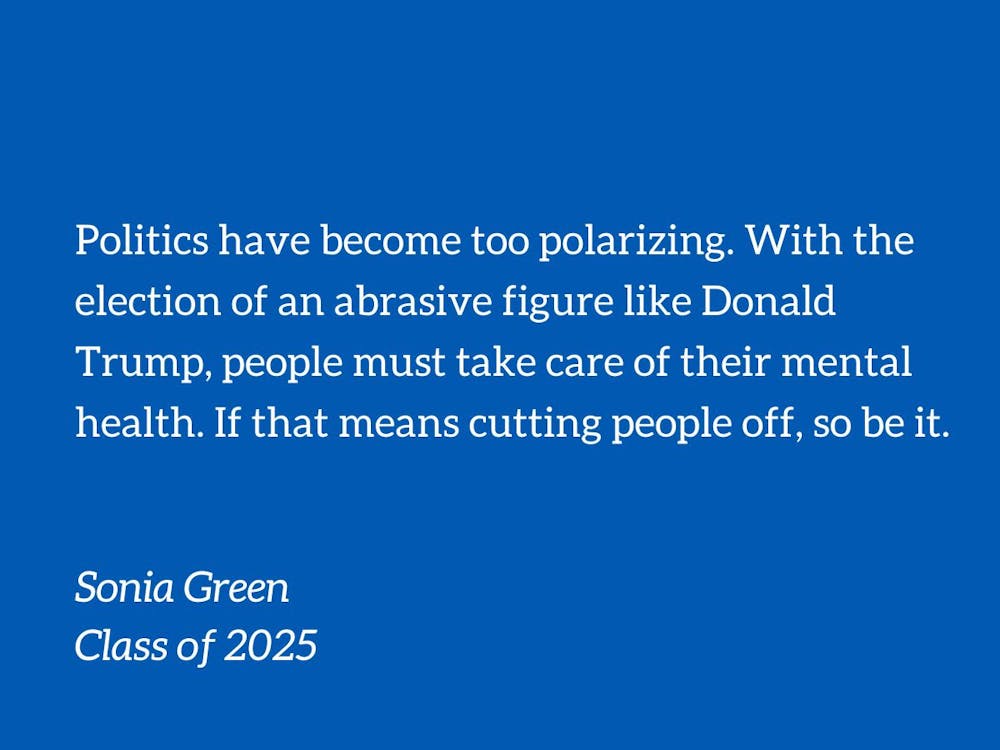When I woke up on November 6th, I immediately checked my phone. Although I had a strong suspicion that I knew who America had elected as our president, I wanted to be sure. After I received confirmation that I was right, a small part of me was happy; my prediction was correct. However, I felt an overwhelming sense of disappointment and concern for my community. In the Mary Lou Williams Center for Black Culture (also called the Lou), we had many conversations about what Donald Trump’s new presidency would mean for the Black community. We were all very concerned, stressed and anxious. Many of my peers conducted a mass unfollowing on social media, purging their accounts of all connections to Trump supporters, and I understand. For the sake of mental health, I believe it is completely acceptable to remove Trump supporters from your life.
As a North Carolinian, I was not surprised to see Donald Trump win over the state. I’ve seen Trump supporters around Durham, at the state fair in Raleigh and even at a Duke football game. I was surprised to see him sweep every single swing state. From Georgia to Pennsylvania to Michigan, Trump supporters represented close to a majority of voters.
Navigating Duke’s campus after such a tense election was a nerve-wracking experience. I don’t mind the idea of having peers with different political views, but this election represented so much more than just political polarization. It represented women’s healthcare, public education, immigration and democracy, and just like Barack Obama’s campaign in 2008, it represented a racial reckoning for America. It’s really difficult to tell at first glance who believes what. I don’t intend to marginalize Duke students who voted for Trump, but as a Black student, it is scary to know that there are students here who subscribe to his beliefs.
This election represents too much. It’s scary to know that there are people who support his pledge to abolish the Department of Education which, among other things, provides supplemental funding to high-poverty K-12 schools. This will directly impact the millions of students whose only option is their local public school. Why should the state of Florida get to dictate what Floridians learn in school when they have already taught students that “some Black people benefited from slavery because it taught them useful skills”? Trump’s mass deportation plan is also concerning. Latinos, both documented and undocumented immigrants, are an integral part of our society and a mass deportation would be devastating. This policy would cost Americans at least $315 billion. If someone cannot support these policies, then they have every right to remove the people in their lives who do.
In the name of tolerance, equality and bipartisanship, I have seen many Trump supporters on social media complain that it is unfair to judge people based on their political beliefs. But I don’t think that’s what's happening here. People aren’t cutting off friends, family members and significant others over their affiliation with a different political party. We have come to associate this election with morality and ethics and that is what prompts the severing of these relationships. An opposing vote now comes with a moral judgment. A vote for Donald Trump is now viewed as a vote against so many things that we hold dear such as diversity, economic opportunity and reproductive rights.
I’m not sure I’m best suited to provide much advice to students who may feel marginalized because they voted for Trump. All I can do is recommend that they open themselves up to a respectful dialogue with people who are hurt by their actions, while also understanding that many people won’t want to talk to them. We’re living in a tough time where some people feel “other-ed” based on their political views, and others are genuinely concerned about their futures.
I hope the next four years can be a peaceful time where we as a country can come together across political lines, but I’m not very optimistic. Politics have become too polarizing. With the election of an abrasive figure like Donald Trump, people must take care of their mental health. If that means cutting people off, so be it.
Sonia Green is a Trinity senior. Her pieces typically run on alternate Thursdays.
Get The Chronicle straight to your inbox
Sign up for our weekly newsletter. Cancel at any time.

